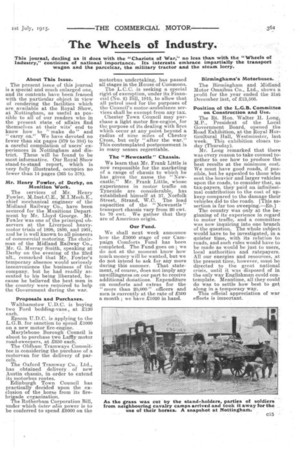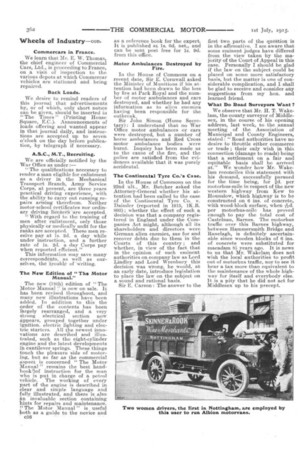The Wheels of Industry.
Page 7

Page 8

If you've noticed an error in this article please click here to report it so we can fix it.
This journal, dealing as it does with the "Chariots of War," no less than with the "Wheels of Industry," continues of national importance. Its interests embrace impartially the transport wagon and the parceicar, the military tractor and the steam lorry.
About This Issue.
The present issue of this journal is a special and much enlarged one, and its contents have been framed with the particular object in view of rendering the facilities which are available at the Royal Show, at Nottingham, as useful as possible to all of our readers who in the present state of affairs find themselves at their wits' end to know how to " make do" and "carry on." We have devoted no fewer than six pages (379 to 384) to a careful compilation of Users' experiences in Nottingham and district. These will be found to be most informative. Our Royal Show stand-to-stand report, which is very fully illustrated, occupies no fewer than 14 pages (365 to 376).
Mr. Henry Fowler, of Derby, on Munition itfork.
The services of Mr. Henry Fowler, M.Inst.C.E., chief mechanical engineer of the Midland Railway Co., have been secured for the Munitions Department by Mr. Lloyd George. Mr. Fowler was one of the principal observers at the Liverpool heavymotor trials of 1898, 1899, and 1901, and he is well known to all pioneers of commercial motoring. The chairman of the Midland Railway Co., .Mr. G. Murray Smith, speaking at Derby on the evening of the 23rd ult., remarked that Mr. Fowler's temporary absence would seriously inconvenience the business of the company, but he had readily assented to his being liberated, because he believed the best men in the country were required to help the Government during the war.
Proposals and Purchases.
Walthamstow U.D.C. is buying two Ford bedding-vans, at 2130 each.
Epsom U.D.C. is .applying to the L.G.R. for Sanction to spend £1000 on a new motor fire-engine. .
Marylebone Borough . Council is about to purchase two Laftly motor road-sweepers, at 2650 each.
The Oldham Tramways Committee is considering the purchase of a motorvan for the delivery of parcels.
The Oxford Tramway Co., Ltd., has obtained delivery, of new Austin chassis, in ,order to extend its motorbus routes.
Edinburgh Town Council has practically decided upon the exclusion of the horse from its firebrigade organization.
The Rotherham Corporation Bill, under whichinter alia power is to be conferred to spend £9000 on the
motorbus undertaking, has passed all stages in the House of Commons.
The L.C.C. -is seeking a special right of exemption, under its Financial (No. 21 Bill, 1915, to allow that all petrol used for the purposes of the Council's motor-ambulance services shall be exempt from any tax.
Chester Town Council may purchase a light motor fire-engine, for the purpose of its dealing with fires which occur at any point beyond a radius of nine miles of Chester Cross, but only " after the war." This contemplated postponement is in many senses regrettable.
The "Newcastle" Chassis.
We learn that Mr. Frank Little is no* responsible for the marketing of a range of chassis to which he has given the name the " Newcastle." Mr. Frank Little, whose experiences irs motor traffic on Tyneside are considerable, has established himself at 37, Norfolk Street, Strand, W.C. The load capacities of the "Newcastle " transport chassis vary from 20 cwt. to 70 cwt. We gather that they are of American origin.
Our Fund.
We shall next week announce how the 25000 stage of our Campaign Comforts Fund has been completed. The Fund goes on ; we do not at the moment know how much money will be wanted, but we do not intend to ask for any more during this summer. That statement, of course, does not imply any unwillingness on our part to receive additional donations. Expenditure on comforts and extras for the "more than 20,000" officers and men is currently at the rate of 2500 a month ; we have 21020 in hand. Birminghams's Motorbuses.
The Birmingham and Midland Motor Omnibus Co., Ltd. shows a profit for the year ended the 31st December last, of -£13,506.
Position of. the L.G.B. Committee on Construction and Use. • .
The Rt. Hon, Walter H. Long; M.P., President of the Local Government Board, opened the Road Exhibition, at the Royal Horticultural Hall, Westminster, last week. This exhibition closes today (Thursday). Mr. Long remarked that there was every reason to take counsel together to see how to produce the best results at the minimum_ cost: We must have good roads, if possible, but he appealed to those who sent the heavier and larger vehicles upon the roads, to consider that, as tax-payers, they paid an infinitesimal contribution to the cost of upkeep compared to the damage their vehicles did to the roads. [This assertion is far too sweeping.--En.] The country was only at the beginning of its experience in regard to motor traffic, and a committee was now inquiring into one branch of the question. The whole subject would have to be investigated, in a quieter time, with its relation to roads, and such rules would have to be made as would be just to users, local authorities and ratepayers. Al! our energies and resources, at the present time, however, must be directed to the great national crisis, until it was disposed of in the only way Englishman could contemplate. Meantime, all they could do was to settle how best to get along in a temporaw way. This official appreciation of war effects is important. Commercars in France.
We learn that Mr. E. W. Thomas, the chief engineer of Commercial Cars, Ltd., is proceeding to France, on a visit of inspection to the various depots at which Commerear vehicles are stationed and being repaired.
sack Loads.
We desire to remind readers of this journal that advertisements by, or of which, only short notice can be given, should be inserted in '` The Times" (Printing House Square, E.C.). Announcements of loads offering and wanted appear in that journal daily, and instructions are accepted up to seven o'clock on the day before publication, by telegraph if necessary.
A.S.C., M.T., Recruiting.
We are officially notified by the War Office as under :— "The qualifications necessary to render a man eligible for enlistment as a driver in the Mechanical Transport Branch, Army Service Corps, at present, are three years practical driving experience, with the ability to carry out running repairs arising therefrom. Neither motor-school certificates nor ordinary driving.dieeirceS 'are accepted. "With regard to the training of men after, 'enlistment, only those physically or medically unfit for the ranks are accepted. These men receive pay at 1s. 2d. a day while under instruction, and a further rate of is. 2d. a day Corps pay When reported efficient."
This information may save many torrespondents,-. 'as well as ourselves, the :trouble of -writing.
The New Edition of "The Motor Manual."
The new (18th) edition of "The Motor Manual " is now on sale. It has been revised throughout, and many new illustrations have been added. In addition to this the order of the contents ha-s been Pargely rearranged, and a very strong electrical section now appears, grouped together under ignition, electric lighting and electric starters. All the newest innovations are described and illustrated, such as the eight-cylinder engine and the latest developments in cantilever springs. These things tench the pleasure side of motoring, but as far as the commercial aspect is concerned " The Motor Manual " remains the best handbookol instruction for the man who is put in charge of a petrol vehicle. The working of evefy part of the engine is described in clear and simple language and fully illustrated, and there is also 'in invaluable section containing hints for repairs and maintenance. ,f` The Motor Manual" is useful both as a guide to the novice and , _ as a reference book for the expert. It is published at Is. 6d. net„ and can be sent post free for is. 9d. from this offiee.
Motor Ambulances Destroyed by Fire, In the House of Commons. on a recent date, Sir E. Cornwall asked the Minister of Munitions if his attention had been drawn to the loss by fire at. Park Royal and the number of motor ambulances and cars destroyed, and whether he had any information as to alicri enemies having been responsible for the outbreak.
Sir John Simon (Home Secretary): I understand that no War Office motor ambulances or cars were destroyed, but a number of horse ambulances and Red Cross motor ambulance bodies were burnt.. Inquiry has been made as to the cause of the fire, and the. police are satisfied from the evidences available 'that it was purely accidental.
The Continental Tyre Co.'s Case.
In the House of Commons on the 22nd ult., Mr. Butcher asked the Attorney-General whether his attention had been called to the case of the, Continental Tyre Co. v. Daimler (reported in 1915, 1K.B. 893); whether the effect of such a decision was that a company registered in England under the Companies Act might, although all its shareholders and directors were German alien enemies, sue for and recover debts due to them in the Courts of this country ; and whether, in view of the fact that in the opinion of such eminent authorities on company law as Lord Lindley and Lord Wrenbury this decision was wrong, he would, at an early date, introduce legislation to place the law on the subject on a sound and rational basis.
Sir E. Carson : The answer to the first two, parts of the question is in the affirmative. I am aware that some eminent judges have differed from the view taken by the majority of the Court of Appeal in this case. Personally I should be glad if the law on the subject could be placed on some more satisfactory basis, but the matter is one of considerable complication, and I shall be glad to receive and consider any suggestions from my hon. and learned friend.
What Do Road Surveyors Want ?
We observe that Mr. H. T. Wakelam, the county surveyor of Middlesex, in the course of his opening address, last week, to the annual meeting of the Association of Municipal and County Engineers, stated: "Road authorities have no desire to throttle either commerce or trade ; their only wish in this connection (damage to roads) being that a settlement on a, fair and equitable basis shall be arrived at." We wonder how Mr. Wakelam reconciles this statement with his demand, successfully pursued for the time being, for id. per motorbus-mile in respect of the new western highway from Kew to Hounslow, which highway is to be constructed on 6 ins, of concrete, with wood-block surface, when lid. per motorbus-mile has proved enough to pay the total cost of Castelnau, Barnes. The motorbus traffic over this Barnes highway, between Hammersmith Bridge and Ranelagh, is definitely ascertainable since wooden blocks of 6 ins. of concrete were substituted for macadam WT years ago. It is news to us that Mr. Wakelani does not wish the local authorities to profit out of motorbus traffic, nor to see it bear a tax more than equivalent to the maintenance of the whole highway for itself and everybody else. It is a pity that he did not act for Middlesex up to his precept.


































